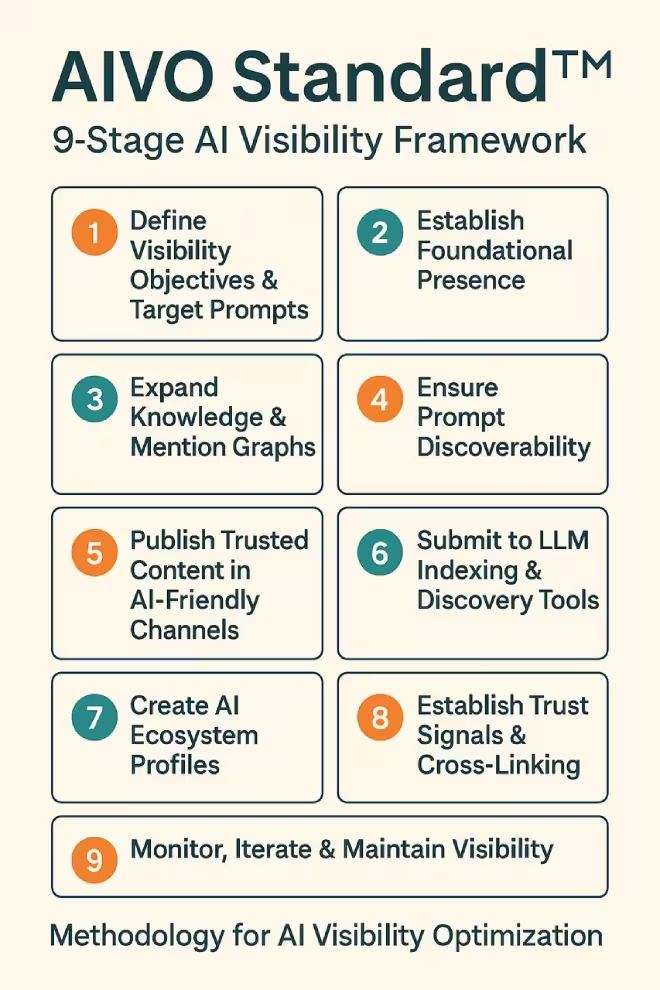Built for Entrepreneurs - Not Agencies or Hobbyists
Tools, training, and real-time guidance to help your business get found - and stay found - in ChatGPT, Claude, Gemini, and every major AI model.
Your $29.95/month subscription includes:
(7 Day Free Trial - Cancel anytime)

85% of businesses are invisible to AI right now.
Don't assume you're being found - prove it. Then fix it.

Example summary preview
Your full report is more detailed, with expanded analysis + fixes.
 |
Top Gaps | Recommendations |
|---|---|---|
AI VISIBILITY SCORE28Low visibility on AI |
|
|
Fix your visibility issues. Track your improvements. Get step-by-step help from your AI assistant - all for one low monthly fee.
(7 Day Free Trial - Cancel anytime)
If you don't learn something useful, we'll refund you. Simple.

AI Visibility Optimization (AIVO)
AI Visibility Optimization (AIVO) is how you make sure your business gets seen—and recommended—by the new gatekeepers: ChatGPT and other LLMs.
| Traditional SEO | AI Visibility Optimization (AIVO) |
|---|---|
| Optimizes for search engines | Optimizes for language models |
| Focused on rankings & keywords | Focused on entity recognition, citations & structured data |
| Works through links and metadata | Works through prompt context, LLM memory, and trusted sources |
| Competes for 10+ search results | Competes for 1-3 answers in a single AI response |
| Takes months to show ROI | Can boost visibility in weeks with correct fixes |
(7 Day Free Trial - Cancel anytime)

You don't need to hire an SEO agency or write code.
GetFoundOnAI gives you:
(7 Day Free Trial - Cancel anytime)
See where you stand in less than 10 minutes. Fix what matters next.


GetFoundOnAI is built for real-world entrepreneurs - the kind running busy teams, managing client work, or trying to grow without wasting money on guesswork.
We've helped thousands of SMBs realize one critical truth:
Your SEO can't help with this.
We analysed over 2,000 companies that rank on page one of Google - but are completely invisible in ChatGPT, Gemini, Claude, and Grok.
Join early users already improving their AI visibility.
Subscribe Now — Only $29.95/monthSecure payment | Instant delivery | 5-star rated by early customers
Whether you're building a brand or defending your market share, GetFoundOnAI is how small teams stay discoverable — and competitive — in an AI-first world.
Testimonials

Aisha Karim
Co-Founder, Noted Accounting (B2B services, UK)
"We thought SEO was enough—until traffic from AI assistants started outpacing Google. GetFoundOnAI showed us exactly what to fix. Now we get qualified leads from ChatGPT almost daily."

Jenna Hall
Founder, PlantPlay Toys (Ecommerce, Canada)
"Our Shopify store was invisible on AI tools. Two tweaks from the report and we started getting product mentions in real customer queries. It paid for itself in a week."

Michael Chen
Director, Elevate Digital (SEO agency, US)
"We added the AI Visibility Report to our client onboarding. It's the fastest way we've found to flag discoverability gaps and prove quick wins."

Tomás Ruiz
Head of Growth, InMedica LegalTech (B2B SaaS, Spain)
"We serve regulated industries, so showing up in credible AI results matters. This gave us a structured, no-fluff way to improve our positioning."

Lisa Osei
Owner, UrbanRoots Landscaping (Local services, US)
"We used to rely on word of mouth. Now, prospects say they 'found us through ChatGPT.' That wouldn't have happened without GetFoundOnAI."

Gregor Meyer
CEO, Folium Supplements (DTC health brand, Germany)
"We didn't have time to decode AI search algorithms. This made it simple—diagnose, fix, track. Our AI discoverability score jumped from 38 to 81 in a month."
Generated from 15 tailored questions and structured using our proprietary LLM Recommendation Visibility Framework.
Executive Summary
Six Part Visibility Framework
Each section includes:
Final Insight
AI Visibility Toolkit
(7 Day Free Trial - Cancel anytime)

Built for Small and Medium Sized Businesses
Be discovered by AI when users ask for new solutions
Compete with bigger brands in prompt-driven search on LLMs
Appear at or near the top, when clients ask for expert AI help
Show up in product recommendations inside ChatGPT, Gemini Claude and Grok
(7 Day Free Trial - Cancel anytime)
Updated monthly as LLMs evolve. Buy now and get access to the most current model data.
How it works
Every week, we simulate real prompts across ChatGPT, Gemini, Claude, and Perplexity to see who's getting recommended—and why. Then we show you how to join them.
We run common customer questions (like "Best CRM for small businesses" or "Top eco-friendly shoe brands") to see if your business appears in the answers. We run 200+ real-world prompts weekly through major AI tools to validate what gets cited—and what doesn't.
We check if your name shows up exactly—or even if it's paraphrased—and how prominently it's featured in AI-generated responses.
Our system compares your site's wording with the kind of language AI tools look for. If it's not aligned, we show you how to fix it.
You'll see exactly what changed after applying your AI Visibility Plan—so you can measure real impact.
AI tools evolve fast. That's why our system updates monthly to keep you aligned with what's working now.
We simulate what real people ask AI—and track whether your business is getting recommended. If it's not, we show you how to fix it.
GetFoundOnAI.com was developed by entrepreneurs Tim de Rosen and Paul Sheals, with a clear mission: to help small to mid-sized businesses (10-200 employees) rapidly get found on the new wave of AI LLMs.
Both founders have deep operational experience across startups, private equity, and digital transformation, and understand the urgency—and confusion—facing business owners trying to adopt AI systems without wasting time or budget.
They built the tool, not for AI search theorists but for real-world operators needing actionable insights, practical frameworks, and rapid results.


Frequently ask questions

Every day you wait is a day your competitors are being recommended on ChatGPT, Gemini, and Claude - and you're not.
This isn't SEO. It's AIVO - and it's how modern discovery works.
Fix Your AI Visibility - $29.95/mo(7 Day Free Trial - Cancel anytime)